8 yoga moves for a happier mood
The ancient movement practice doesn't only benefit joints and muscles. It may help improve your mental outlook.
Updated on March 29, 2024

The physical health benefits of yoga are well-known, from reduced pain to more flexible muscles and joints. But did you know that it can also give you a mental lift, too? Studies suggest that a regular yoga practice (along with other exercise) can improve your outlook and ease symptoms such as depression, anxiety, and insomnia.
“Breath awareness is an important part of every yoga practice,” says certified yoga instructor Theresa Brennan, who created this sequence. “It helps you put aside worries and focus on being in the moment. That alone can reduce stress and promote a sense of well-being.”
All you'll need to begin is a yoga mat and a block. Repeat the sequence three times per week to gain the most benefits.
Just remember that as gentle as yoga might seem, certain forms and poses may involve vigorous movement and intense forms of stretching—which can cause harm if not done correctly or gradually. If you've never done yoga before, check with your healthcare provider before starting your practice and take a class with a credentialed instructor.
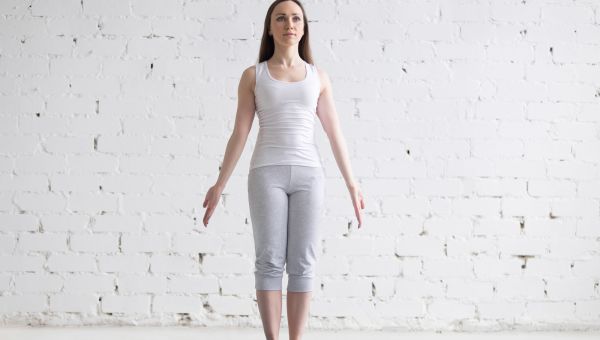
Mountain Pose (Tadasana)
While deceptively simple, Mountain Pose is an essential starting place for this sequence. It grounds you in the here and now and prepares your body for the moves to follow.
Begin by standing with your feet parallel, big toes touching. Bring energy and purpose to the pose by firming your thigh muscles (don't lock your knees) and lengthening your tailbone. Imagine a straight line running from the top of your head to the ground between your feet. Engage your abs to protect your lower back. Allow your arms to hang at your sides, palms facing forward. Keep your gaze soft and take several calming breaths.

Warrior II (Virabhadrasana II)
“These poses will make you feel powerful and confident, leading to a happier you,” says Brennan.
Stand tall and take a large step back with your right foot. With your left foot pointing forward, bend your left knee. Make sure you keep your left knee over the heel of your left foot.
Turn your right foot out at a 90 degree angle. Align your right heel behind your left foot. Lift your arms, keeping them parallel to the floor, palms down. Turn your head to gaze over your left arm. Take several slow, deep breaths. Return to the standing position and repeat with your right foot in front.
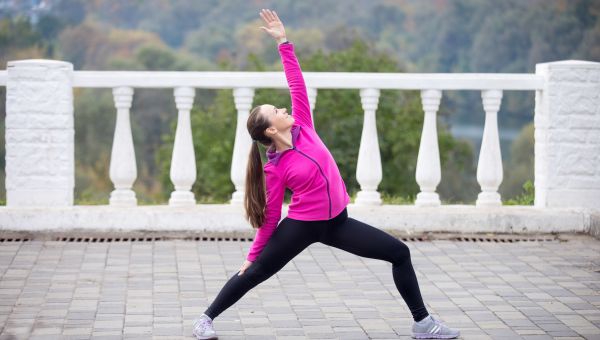
Peaceful Warrior (Shanti Virabhadrasana)
Peaceful Warrior, also referred to as Reverse Warrior, gives you a gentle side stretch, allowing you to breathe more deeply.
From Warrior II pose, with your left foot forward, flip your hands so that your palms face up. Lean straight back at the waist and raise your left arm, sweeping it over your head, palm facing down. Lift your gaze to your palm. As you lean back, slide your right hand down your right leg, allowing your hand to rest on your thigh. Take several breaths. Return to Warrior II starting position, this time with your right foot in front, and repeat Peaceful Warrior.
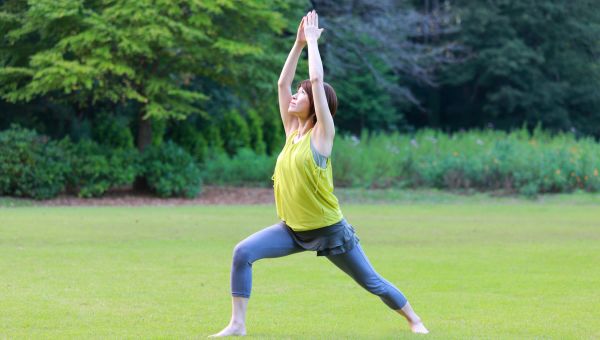
Warrior I (Virabhadrasana I)
The warrior poses, which lift and expand the chest area, are sometimes referred to as heart openers. Try letting the expansiveness of these poses extend off the mat as well. You'll be opening yourself up to more joy.
Stand tall with feet together, hip-width apart. Take a big step back with your left foot. Bend your right knee with your right foot pointed forward. Turn your left foot out about 45 degrees. Lean back and lift your heart (chest). Raise your arms to your sides, keeping them slightly bent, with palms up. Shift your gaze to the ceiling or sky. Take several deep, calming breaths. Return to the starting position and repeat with your left foot in front.
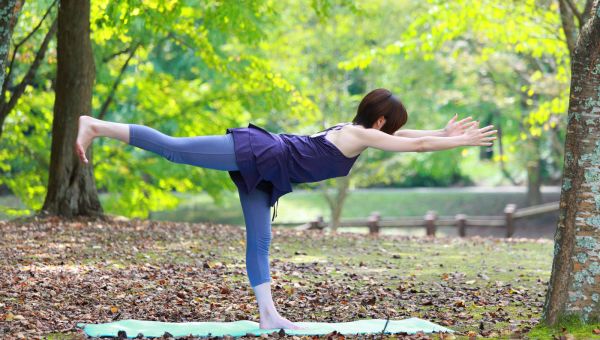
Warrior III (Virabhadrasana III)
When stress and tension run high, Warrior III can help calm your nerves, reduce anxiety—and take you to a more relaxed, happier place.
Stand tall with your feet hip-width apart. Step your right foot back by about two feet. With your left foot pointing straight ahead, shift your weight to your left leg. Bend forward and lift your right leg, keeping it parallel to the ground. Shift your gaze straight down. Extend your arms forward with palms facing each other. Contract your abs and engage the muscles of your left leg to help maintain balance. Hold the pose for 5 to 10 breaths. Return to a standing position and repeat on the other side.
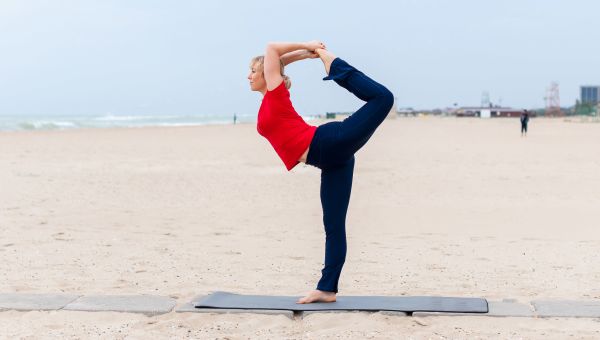
Dancer Pose (Natarajasana)
You’ll feel lighter in body and spirit with the playful Dancer Pose.
Stand straight with feet parallel about hip-distance apart. Shift your weight onto your right foot. Bend your left knee and move your left foot toward your left buttock. Reach back with your left hand and take hold of the ankle or heel of your left foot. Pull your leg up and away from your body. As you do so, your torso will lean forward. Shift your gaze straight down to the ground and extend your right arm. Hold the pose for several breaths. Return to a standing position and repeat on the other side.
Note: Dancer Pose is an intermediate-level pose. If you're just beginning yoga, you may want to skip this one until you develop more confidence in your practice. When you are ready to try it, consider having something nearby to help with your balance, like a chair or wall.

Triangle Pose
Triangle Pose is more than a feel-good stretch. “This pose opens your heart, allowing for an emotional release that can lead to an elevated mood,” says Brennan.
Stand with your feet three to four feet apart with arms raised at your sides. Slightly angle your right foot in. Turn your left foot out 90 degrees. Hinge from the hips to the left, directly over your left leg. Rest your left hand in front of your left ankle or along your left leg; your chest should not collapse forward. Stretch your right arm toward the ceiling or sky. Turn your head to gaze at your outstretched hand. Hold the pose for several breaths. Return to a standing position; repeat on the other side.

Half Moon (Ardha Chandrasana)
Resting one hand on a block makes it easier to maintain this chest-opening pose.
Place a block about eight inches in front of your right foot. Shift your weight to your right leg and lean forward, placing your right hand on the block while keeping your arm straight. Allow your left leg to lift so that it’s parallel to the ground. Straighten and firm the muscles of your right leg to stabilize the pose. Rotate your torso to the left and lift your left arm straight to the ceiling. Allow your head to follow and shift your gaze to your extended left hand. Return to a standing position and repeat on the other side.
Note: Half Moon is an intermediate-level pose. If you're just beginning yoga, you may want to skip this one until you develop more confidence in your practice. When you are ready to try it, consider having something nearby to help with your balance, like a chair or wall.

Harvard Health Publishing. Yoga for better mental health. June 12, 2021.
Verzili B, Valério de Arruda M, Herrmann F, Reyes MB, Galduróz RF. A systematic review with meta-analysis of Yoga's contributions to neuropsychiatric aspects of aging. Behav Brain Res. 2023;454:114636.
More On


video


video


video


video


video
